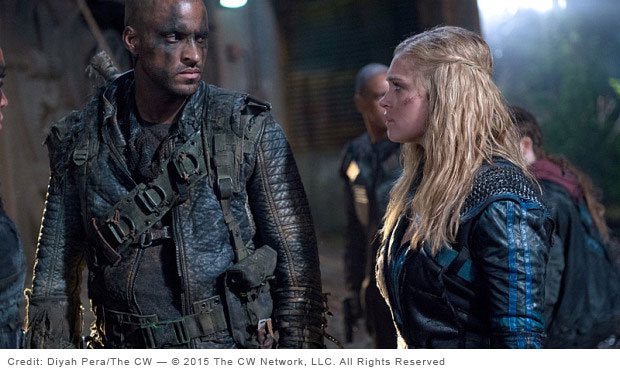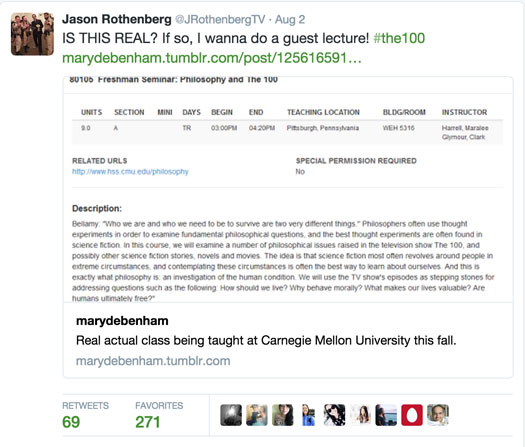Philosophy and “The 100”
By Shilo Rea

Science fiction will meet philosophical scrutiny in a Carnegie Mellon University classroom this semester.
Students in the Freshman Seminar “Philosophy and The 100” will examine issues the popular television show raises. “The 100,” which airs on the CW, is set decades after most life is eliminated from earth, and survivors on space stations decide to send 100 juvenile delinquents back to the planet to see if it is habitable.
If this sounds gimmicky or like an opportunity to take a class just to watch television, it’s not. Mara Harrell, associate teaching professor of philosophy in the Dietrich College of Humanities and Social Sciences, frequently uses science fiction as the topics of freshman seminars. Previously, Harrell drew on The Matrix, Star Trek, The Minority Report and others to address questions about behaving morally, the value of life and if humans are ultimately free.
“Really good science fiction is a genuine reflection of the human condition, and the way that the people think and behave resonates,” she said.
Harrell, who is co-teaching the course with Philosophy Professor Clark Glymour, believes the one of the show’s central themes, “Who we are and who we need to be to survive are two very different things,” its evolving plot and putting characters into extreme situations allow students to learn and self-reflect.
“The 100 presents a wide array of ethical and socio-political dilemmas that are just the kinds of questions with which college students face as they engage in personal discovery,” Harrell said.
Over the summer, the class and course description caught the attention of the series’ creator and executive producer, Jason Rothenberg, and the national media. Rothenberg even tweeted that he would be willing to guest lecture. Harrell said she’d love to have him participate in the class.

Each year, the Dietrich College offers various freshman seminars — special courses designed to introduce students to the faculty’s diverse research areas. In intimate class settings, students are able to dig into topics that interest them and receive training on how to successfully research issues in the humanities and social sciences.
“Freshman seminars help students make the transition from high school to college as well as expose them to very specific research areas within the college’s many disciplines,” said Joseph E. Devine, associate dean of the Dietrich College.
Three seminars each year are endowed by gifts to the college. “Philosophy and The 100” is the 2015 John C. Vassil Seminar, named after the late College of Engineering graduate who majored in chemical engineering and became a law partner at Moran-Finnegan LLP. The two others are the Frank Brunckhorst Seminar, funded by Brunckhorst, a CMU life trustee and head of Boar’s Head Provisions, which will be offered by the Center for the Neural Basis of Cognition this year, and the Richard Schoenwald Seminar that supports a course from the History Department in honor of the late and beloved history professor.
“The named seminars are a great way for us to recognize individuals who care deeply for education and research as well as give our students the chance to learn from our top-rated professors in a small class setting,” Devine said.
Freshman seminars can be eye-opening experiences for students — just ask current sophomore Ian Sears. After taking English Professor Jim Daniels’ “Creative Writing Matters” course last year, Sears decided to major in creative writing. He won the Palo Alto Online’s short story contest with a draft of the story “Opuntia” that he wrote for the class.
“My favorite part of the seminar was getting feedback on my work that inspired me to change my work in ways that I may not have thought on my own,” Sears said.
Read more about undergraduate course opportunities at CMU.